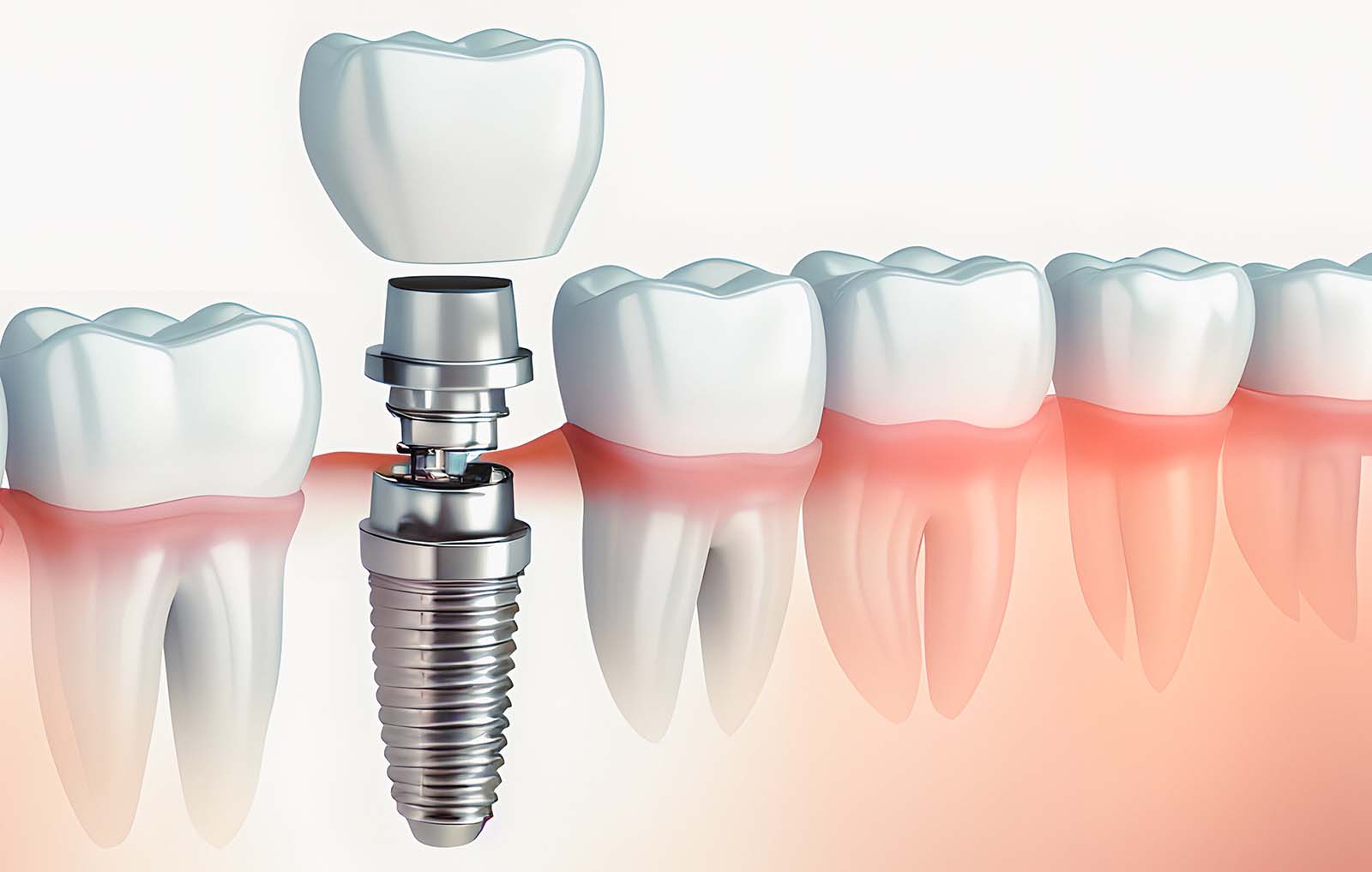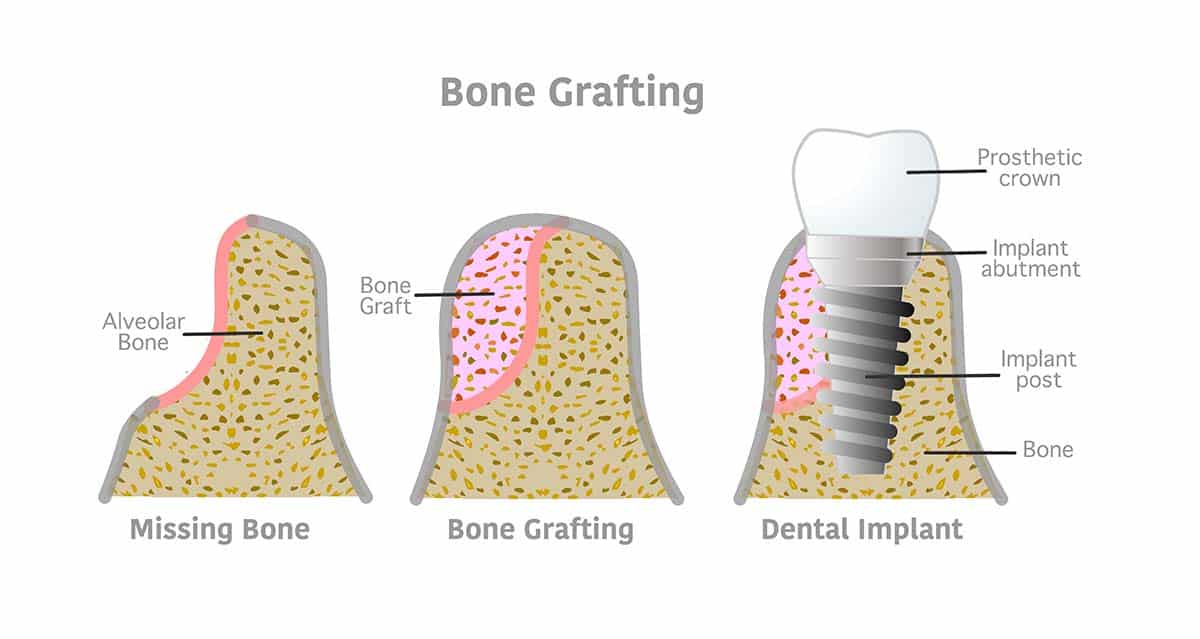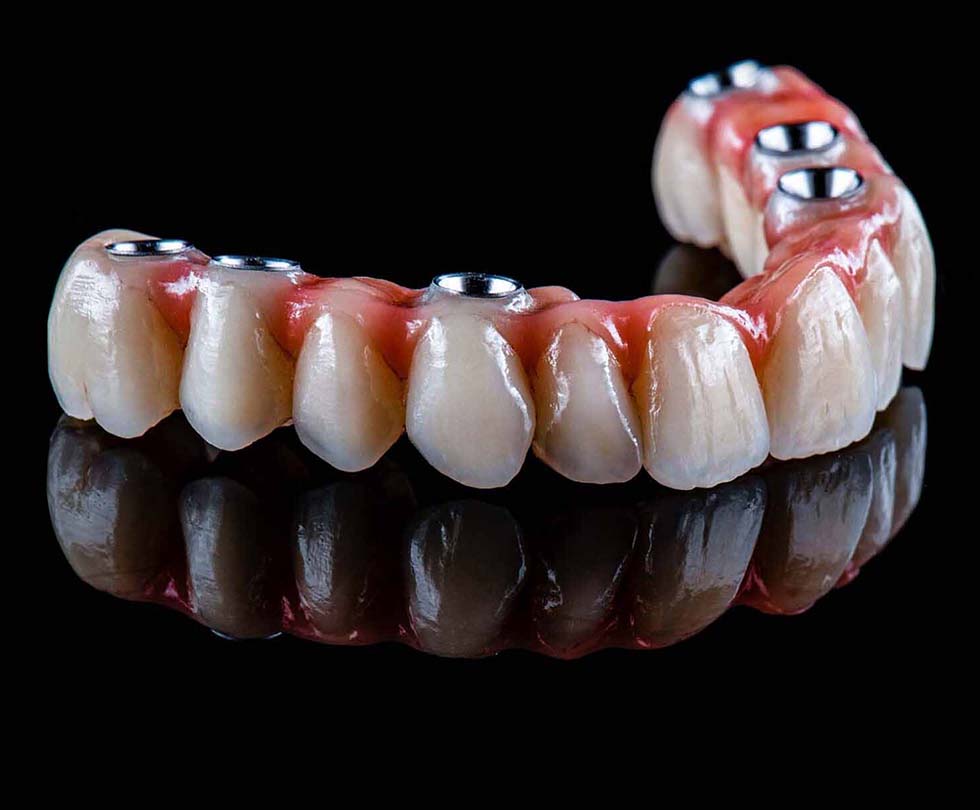Humans have used a variety of methods to replace missing teeth since the dawn of time. Replacement teeth made of bone and shell were used by ancient Egyptians to restore their smiles after they had lost their natural teeth. According to archaeologists, oral implants made of carved shells were used by civilizations in South America as far back as 600 BC, as even our ancestors recognized the benefits of dental implants. When Swedish orthopedic surgeon Ingvar Branemark discovered that titanium could successfully fuse with human bone in the 1950s, a major step forward in dental replacement technology was made possible. The first titanium dental implants were implanted by Branemark in 1965, and they lasted the patient’s entire life. Since then, the durability of dental implants has been even more improved. Dentists are now placing nearly half a million implants each year.
There are many advantages of dental implants. The high success rate and simplicity of dental implants make them a popular choice among patients and dentists alike. Unlike removable equipment that needs to be cleaned or could be lost when removed, these items are extremely convenient. There is a lot to learn about dental implants, including how they’re put in place, how they’re maintained, and how long they’ll take to heal. In order to make an informed decision about dental implants, patients need to be educated about the entire process. Here, we’ll answer some of the most common questions and concerns patients have about the implant process, so they can make an informed decision about whether the procedure is right for them. If you have ever asked “are dental implants a good idea?” keep on reading.
What Are Dental Implants?
So how do dental implants work? A dental implant is a device intended for oral use, typically consisting of a small post made of titanium, which serves as a substitute for the root of the tooth. There is typically a connector referred to as an abutment that is built-in to the top of the implant that allows for a connection to the replacement artificial tooth. On top of all of this structure is a crown that is fabricated on an individual basis to match the patient’s natural teeth. This entire structure encompasses the whole of a dental implant. The benefits of dental implants are numerous and long term. The truth about dental implants is that they are one of the least problematic forms of tooth replacement available.
Finding the best dental Implants in Los Angeles, Could be challenging. Only Southland Dental Care offers free consultation, free CT-Scan and monthly payments as low as $69 per month.
Who is a Candidate?
You may be wondering: “can anyone get teeth implants?” For many patients, dental implants are the best option when it comes to oral reconstruction, but this is not the case for everyone. Dental implants are only suitable for certain people, and there are several factors to take into account before that can be determined. As a starting point, the patient must be in good overall health and have a reasonably healthy mouth. The patient’s jawbone should be strong enough to support the implant, and the gums should be free of periodontal disease. Good oral hygiene habits and adequate bone density in a patient’s facial structure are prerequisites for dental implants. As well as not smoking, the patient must be willing to complete the entire process, which can take up to a year. The adjustment period for dental implants is critical to their long-term tooth implant success rate.
See Also: Am I a Candidate for Dental Implants
The Benefits of Dental Implants
Oral implants have a slew of advantages, but we’ve narrowed it down to the most frequently cited by patients. In the first place, one of the benefits of dental implants is they more aesthetic because it is made to look like a natural tooth. The right dental implant can conceal the fact that a tooth was lost because of the wide range of sizes and shapes it is available in. Dentists use dental implants to prevent further bone loss in the jaw and to restore bite force after a patient loses a tooth or teeth.
Another one of the advantages of dental implants is that they help support the facial structure and restore a more youthful appearance when teeth are missing or extracted. Implants can also prevent the loss of one’s ability to speak naturally, which is impaired when teeth are lost. Implants are not susceptible to cavities and are simple to maintain. Because a space between teeth can lead to further tooth loss, dental implants can act as a support for adjacent teeth. They also don’t slip around like dentures do, which is a common problem. Many patients indicate that they are pleased with their dental implant results.
Disadvantages to Consider
While there are many advantages of dental implants, there are also several disadvantages to dental implants that should be considered before deciding on this treatment option for some patients. The advantages of dental implants include low patient maintenance, improved appearance and visual appeal, as well as long-term durability. However, dental implants are incredibly expensive. Even with insurance, a full set of dental implants for a full oral reconstruction can cost anywhere from the tens of thousands to a few thousand dollars for a single implant. Some dental insurance policies do not cover them, which is more common than you might think. In some cases, dental insurance will cover the restoration of a crown or denture, but not the implant procedure. Before having dental implants, patients should check with their insurance company to see if they are covered.
Another drawback is that the majority of them necessitate surgery to be implanted. There are health risks associated with any surgical procedure, but those risks are amplified if the patient requires complete sedation, which is highly dependent on their overall health. Infection or damage to other teeth, bone healing delays, prolonged bleeding or jaw fractures, as well as possible nerve damage, are all possibilities for patients undergoing this procedure, despite the low complication rate of 5 to 10%. This means that even though an implant is expected to last a patient’s lifetime, the upper structure, the restoration, will almost always need replacement at some point. If the implants fail to heal properly, there is a risk of bone loss. Finally, even though only about 10% of dental implants fail, it is always possible that they will not work. However, it is worth noting that the reasons to get dental implants often outweigh these disadvantages.
How Successful Are Dental Implants?
You might be wondering “Is dental implant safe?” When it comes to oral reconstruction, dental implants are among the most successful methods and dental implant results are usually positive. However, some patients do experience failure. A failure rate of 5% to 10% is expected in the first six months of use, but it can also occur years later. Dental implants can fail for a variety of reasons, including gum disease, a lack of jawbone density, smoking, poor oral hygiene, medical conditions, or improper placement by a surgeon without experience. It is possible for the body to reject a foreign object, resulting in increased pain and swelling at the implant site, which can lead to complications.
Indications that an implant has failed include bleeding gums, excruciating pain, swelling, implant loosening, and difficulty chewing. Dentists recommend that patients see their dentists every six months, avoid smoking, and increase their calcium intake to support their bones so that their dental implants can last for many years. Dental implants are more likely to succeed if the patient improves his or her lifestyle, adopts a healthy oral hygiene regimen, gives up unhealthy habits, and visits the dentist on a regular basis.
See Also: How Successful Are Dental Implants
Does Your Insurance Cover Dental Implants?
As soon as you’ve researched dental implants and decided that they are the best option for you, it’s time to consider your options if your insurance doesn’t cover the procedure. Many people base their decision on their ability to afford oral implants. Regrettably, the implant is often not covered by insurance, or it is only covered in part as part of the treatment. In order to make an informed decision about whether or not to proceed with treatment, it is critical that the patient familiarize themselves with their dental insurance policy. If your insurance does not cover the cost of the procedure, we at Southland Dental Care offer financing options. For dental implants, we offer low monthly payments as low as $69 and a free consultation and CT scan.
See also: Dental Implants Cost
To summarize, because most standard dental insurance policies do not cover the procedure, you may want to look into a cosmetic dental procedure policy that will cover a portion of the cost. After the deductible is met, some insurance companies will pay up to half of the procedure’s cost, and some may even consider covering the procedure altogether. On a case-by-case basis, some insurance companies determine how many dental implants are needed, the type of implants used by your dentist, what will be required prior to your procedure, such as an extraction, and if there are cheaper or more cost-effective alternatives.
Consult your insurance company to make sure your dentist is in the proper network, or that an oral surgeon recommended by your dentist is covered by your insurance. Dentists should assist you in filling out and filing the claim as well as researching reimbursement options.
See also: $399 dental implants
The Implant Procedure
Have you ever wondered “how long does a dental implant procedure take?” The dentist’s method for installing the implant will be heavily influenced by the system he or she chooses. One of the most common types of dental implants is the endosteal implant, which is made of titanium and resembles a screw and is inserted into the jawbone. Patients who do not have enough bone structure for regular dental implant placement but do not want to undergo a bone graft can use the subperiosteal procedure. Once the dentist has assisted the patient in making a decision between these two options, the configurations can then be decided upon. A single implant will be used to replace a single missing tooth. It is possible to create an implant-supported bridge by placing two crowns on either side of a tooth gap to replace multiple teeth. Another option is an implant-retained denture, which is typically used to replace all of a patient’s teeth. The patient will have a set of false teeth that will last for the rest of their life, unlike traditional dentures.
Titanium alloys are used in the implants’ construction because of the metal’s high corrosion resistance, stiffness, and biocompatibility. Other metals, such as gold and stainless steel, have been used, but they have a higher rate of failure and adverse reactions. In the present day, they are regarded as obsolete by the industry.
To Begin With
A comprehensive dental exam, including x-rays and 3-D images of the teeth and jaw models, is common prior to the procedure. Your medical history will be thoroughly reviewed by the dentist, and he or she may prescribe antibiotics prior to the procedure in order to prevent infection. Each patient’s treatment should be tailored to their specific needs, taking into account things like how many teeth they need to be replaced and the health of their jawbone when creating a customized treatment plan. The dentist will also discuss pain control options like anesthesia, sedation, or general anesthesia during this time.
The Procedure
A dental implant procedure can include any of the following:
- The extraction of the damaged tooth
- Preparation of the jawbone when needed, such as a bone graft
- Placement of the dental implant
- Bone growth and healing
- Abutment placement
- Placement of the artificial tooth.
If the situation is severe, it may take months to begin the healing process from beginning to end. It takes time for new bone to form in the jaw, and this process can be sped up with the use of certain materials or processes. A bone graft may be required before an implant can be placed if the jawbone is too soft or too thin to support it. Because of the high chewing force, the implant can fail if the bone supporting it is not strong enough to withstand the pressure. Synthetic material or bone from elsewhere in the body can be used as a graft. In order to support an implant, a bone graft may take several months to heal sufficiently.
A cut is made in the gum to expose the bone, holes are drilled into the jawbone, and the dental implant post is inserted. To protect the area while it heals, a cap or temporary denture is usually placed on top. To ensure a strong foundation for the new tooth, the surrounding gum tissue is allowed to heal for a period of time, sometimes as long as several months. The abutment will then be implanted following this procedure. The gum is reopened to expose the implant, the prosthetic is attached, and the gum tissue is then closed around but not over the placement.
Are Dental Implants Painful?
Any part of the procedure can cause some discomfort, including minor bleeding or pain at the implant site, as well as bruising and swelling of the skin and gums on the face. The patient may require pain medication or antibiotics after the dental implant surgery, but the patient should contact their oral surgeon immediately if any of the conditions worsen. While the surgical site heals, it’s important to stick to soft foods like soups and broths. Straws should be avoided for a few days after the procedure, and the patient should expect some minor swelling for up to five days. The patient should also avoid hot food for the first 48 hours. For the first 48 hours, a liquid diet and saltwater rinses are recommended, as well. The bottom line is that the patient should not be experiencing severe pain after the first five days following the procedure, and the discomfort should be largely gone within two to three weeks of the procedure.
How to Care for Dental Implants
For an implant to last, it must be kept clean and free of damaging bacteria and plaque, which can cause infection in the tissues surrounding the implant and lead to failure. Specific techniques and efforts are required to ensure the ongoing durability of dental implants. Peri-implantitis can develop and lead to implant loss if the biofilm is not removed thoroughly. Caring properly for your implants is what leads to a high tooth implant success rate and higher dental implant reliability. The dental implants before and after care procedure will also vary according to its type.
For single implants:
- At least twice a day, brush your teeth with a soft-bristle toothbrush.
- Use unwaxed tape or implant-specific floss every day.
- Make use of an oral irrigator that has been prescribed to you.
- Use a toothpaste that isn’t too abrasive
- Hard-to-reach areas of the mouth can be cleaned with a nylon-coated interdental brush.
- Brush under and around the crown of the implant
For overdentures:
- Replace O-rings and locator caps once a year with the advice of your dentist.
- Check for worn or missing o-rings, locator caps, or clips, and notify your dentist.
- Use a denture brush to gently clean the underside of the denture.
- To clean your denture, remove it every day and soak it in a specific cleaner for the recommended amount of time.
- Before placing an overdenture in your mouth, thoroughly rinse it with water.
What is The Cost?
Many wonder why dental implants are so expensive, usually costing more than other forms of tooth replacement. To begin with, dental implants are considered an investment and are designed to last a lifetime, and dental implant reliability is higher than other forms of oral reconstruction. This makes it necessary to construct them out of more durable and expensive materials. Next, the implant procedure frequently necessitates several steps before it is considered complete, so paying for dental implants also includes paying for specialists such as a dentist and lab technicians involved in the process, x-rays, custom-made crowns, multiple appointments, and the use of special tools and materials. If you wish to know our full range of services and their associated costs, visit our website that goes into full detail concerning costs. We offer a free consultation, free CT scan, and affordable monthly payment options. The dental implants before and after procedure will be unique to your needs.
Where to Go in Los Angeles for Dental Implants
If you are looking for dental implants near me, Southland Dental Care is the place to go in Los Angeles if you are in need of dental implant work, periodontics, and many other forms of cosmetic dentistry. Our doctors have several years experience in dental health, and have been serving the Sherman Oaks area for years now. Give us a call at 818.788.8787 to set up your consultation today.















